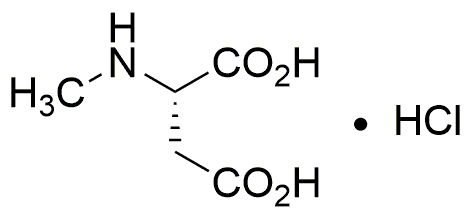N-Methyl-L-aspartic acid hydrochloride is widely utilized in research focused on:
- Neuroscience Research: This compound serves as a potent agonist for NMDA receptors, making it invaluable for studying synaptic plasticity and neurodegenerative diseases.
- Pharmaceutical Development: It is used in the development of drugs targeting neurological disorders, providing insights into potential treatments for conditions like Alzheimer's and Parkinson's disease.
- Biochemical Assays: The compound is employed in various biochemical assays to evaluate receptor activity, helping researchers understand receptor dynamics and drug interactions.
- Cell Culture Studies: It is utilized in cell culture systems to enhance neuronal growth and differentiation, facilitating studies on brain development and function.
- Behavioral Studies: Researchers use it in animal models to assess cognitive functions and behavioral responses, contributing to the understanding of learning and memory processes.
General Information
Properties
Safety and Regulations
Applications
N-Methyl-L-aspartic acid hydrochloride is widely utilized in research focused on:
- Neuroscience Research: This compound serves as a potent agonist for NMDA receptors, making it invaluable for studying synaptic plasticity and neurodegenerative diseases.
- Pharmaceutical Development: It is used in the development of drugs targeting neurological disorders, providing insights into potential treatments for conditions like Alzheimer's and Parkinson's disease.
- Biochemical Assays: The compound is employed in various biochemical assays to evaluate receptor activity, helping researchers understand receptor dynamics and drug interactions.
- Cell Culture Studies: It is utilized in cell culture systems to enhance neuronal growth and differentiation, facilitating studies on brain development and function.
- Behavioral Studies: Researchers use it in animal models to assess cognitive functions and behavioral responses, contributing to the understanding of learning and memory processes.
Documents
Safety Data Sheets (SDS)
The SDS provides comprehensive safety information on handling, storage, and disposal of the product.
Product Specification (PS)
The PS provides a comprehensive breakdown of the product’s properties, including chemical composition, physical state, purity, and storage requirements. It also details acceptable quality ranges and the product's intended applications.
Certificates of Analysis (COA)
Search for Certificates of Analysis (COA) by entering the products Lot Number. Lot and Batch Numbers can be found on a product’s label following the words ‘Lot’ or ‘Batch’.
Número de catálogo
Número de lote/lote
Certificates Of Origin (COO)
This COO confirms the country where the product was manufactured, and also details the materials and components used in it and whether it is derived from natural, synthetic, or other specific sources. This certificate may be required for customs, trade, and regulatory compliance.
Número de catálogo
Número de lote/lote
Safety Data Sheets (SDS)
The SDS provides comprehensive safety information on handling, storage, and disposal of the product.
DownloadProduct Specification (PS)
The PS provides a comprehensive breakdown of the product’s properties, including chemical composition, physical state, purity, and storage requirements. It also details acceptable quality ranges and the product's intended applications.
DownloadCertificates of Analysis (COA)
Search for Certificates of Analysis (COA) by entering the products Lot Number. Lot and Batch Numbers can be found on a product’s label following the words ‘Lot’ or ‘Batch’.
Número de catálogo
Número de lote/lote
Certificates Of Origin (COO)
This COO confirms the country where the product was manufactured, and also details the materials and components used in it and whether it is derived from natural, synthetic, or other specific sources. This certificate may be required for customs, trade, and regulatory compliance.


